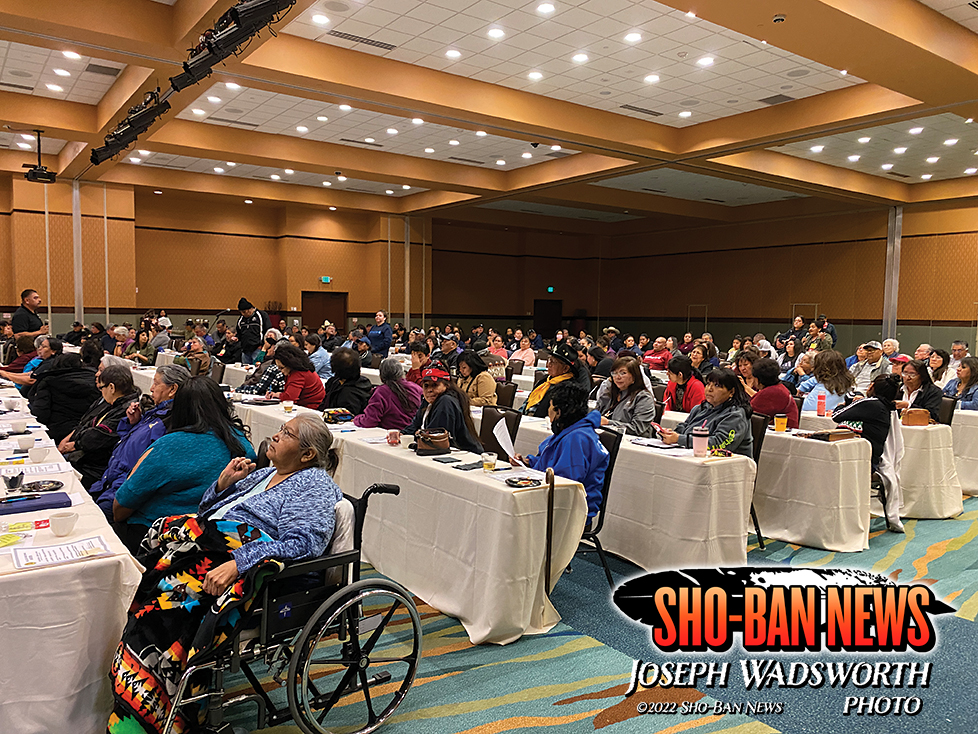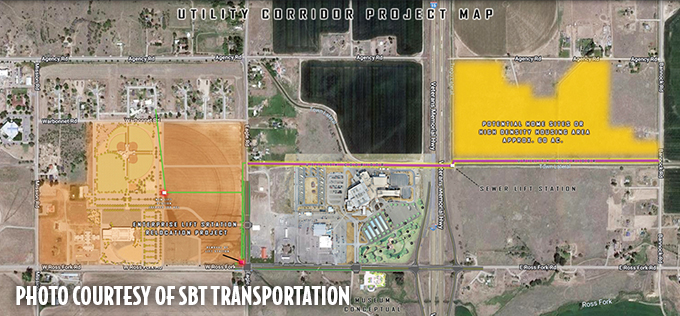Quorum reached at Called Meeting, several topics discussed

Shoshone-Bannock tribal members at the April 9 Called Meeting.
By LORI ANN EDMO
Sho-Ban News
FORT HALL — Numerous updates were provided on a variety of topics April 9 at the Shoshone-Bannock Tribes Called Meeting.
A quorum of 100 was reached at 10:27 a.m. when Fort Hall Business Council Chairman Devon Boyer called the meeting to order and the minutes from June 20, 2015 (the last time a Called Meeting reached a quorum) were read and approved.
Tribal elections
Tribal Election Board member Audrey Ponzo gave an update on elections. She explained a handout where vote by mail was decided November 2021 and the FHBC approved it. At the time COVID-19 was rampant so they figured it was the best choice. She said they have more participation in the vote by mail process. On October 27, 2021 a letter was mailed to over 1200 registered voters with the proposed changes for vote by mail and it had a comment section. The TEB received 11 written responses, four phone calls and five in person comments. All were positive and supportive of the vote by mail. As of April 9, there are 1,291 registered voters.
Karen Osborne believes the mail balloting is hard for elderly people because some didn’t get their ballots because they had no ride to the post office. She thinks the voting should return to the lodges.
Sherwin Racehorse said the issue was fought in Tribal Court and it wasn’t because of being bad losers, “It’s about the Constitution – look at the Constitution that reads all elections should be by secret ballot and the mail in ballot is not a secret ballot.” He said it’s intended top walk into a lodge, get the ballot and go into the voting booth to mark the ballot. He understood it was because of the pandemic but there’s no regulations on the secret ballot. He added a voter could move, someone else gets the ballot and vote for you. Racehorse said it’s time to go back to the polls in the districts. If the Tribes legalize mail in ballots then it would require a Constitutional amendment. He urged the tribal attorneys to provide legal advice and take a better look at what they’re doing.
Wes Edmo said he’s glad the Tribes are having a meeting to allow for people to participate. He said the spirit of the old people are always with us and need to look out for one another. He said access needs to be allowed for everyone and those who are disabled shouldn’t be disenfranchised. The FHBC needs to assure civil liberties are protected. It’s important attorneys advance tribal members and council’s rights. Participatory government important.
Lance Tissidimit thanked the Election Board for doing a good job and he thanked everyone for their comments. Concerning the Land Use Policy Commission ballot, he believes one individual should be removed from the ballot for doing shady stuff. Background checks should be done on the candidates.
FHBC Vice Chairperson Marlene Skunkcap said the mail in voting happened because of COVID-19 and next year can go back to district voting.
Ferdinanda Shay agrees there should be background checks for individuals who are candidates because it is not known what they may have done in the past as she agrees with Tissidimit.

Utility Corridor Map.
Festival update
Randy’L Teton said the council appointed Leah (Pandoah) Hardy as the Festival coordinator but she couldn’t be present for the meeting. A press release is being done Tuesday (April 12) to advise whose on the committee. Destiney Tinno is the royalty coordinator. More information will be posted on the Festival web site shobanfestival.com A question was asked about the outside rail at the racetrack as it was taken down last fall. Fort Hall Indian Relay Association president Alonzo Coby said the rail would be started on next week. Public Works is hauling in top soil because there’s lots of rocks. The track will be dug down deeper. Another question was asked about the handgame structure as it’s been taken down and Teton said a temporary structure would be built.
Cecil Broncho asked whether it’s appropriate to have the Festival because of the new variants related to COVID? FHBC chairman Devon Boyer said the council decided to move forward noting COVID is still here, also the variants.
Utility Corridor Project
The Utility Corridor Project would provide a utility backbone approximately one mile for nearly all services and approximately 2.1 miles of a high-pressurized natural gas mainline. The project will provide all needed utility services for economic development, local government services and housing development projects planned in the future. The Enterprise Lift Station Project is a complementary support project to expand the support area according to a handout provided.
Elma Thompson, FHBC treasurer, introduced Brooks Davis from the Tribal Transportation department to give the update on infrastructure improvements to be paid from American Rescue Plan funds to reduce the effects of COVID.
Davis oversees project management and construction management on roads projects. The department is working on Sage (Riverton) Road and the Idaho Transportation Department will soon be working on the Exit 80 interchange that includes four lanes and a walking path where they will be sleeving (putting a bigger pipe) underground that utilities can be pushed through. ITD will also be replacing the box culvert at the interchange.
Brooks is the chair of the Wellness Center since 2012 and what was discovered is there is not enough gas to heat the facility and there’s not enough power so a large upgrade is needed. He talked to Intermountain Gas and there’s a need to tie into the gas line on Eagle Road that would be a high pressurized line to Bannock Road. It would be tied into main line that crosses Ross Fork Road near the old gas pump station.
A map was displayed that showed improvements to sewer lift stations, water, gas line, etc. It showed an area for potential homesites but there’s currently no funds for it. He said there’s a lot of planned facilities for the area so the improvements are needed. Concerning broadband, they will have the ability to connect to two main fiber lines — the first on 91 and the second is when ITD does the new upgrade on I-15 where there will be an additional fiber line. It will provide for more options for internet service.
Marina FastHorse asked what about the landowners regarding the Exit 80 interchange? Davis said the BIA sent out consent packets. FastHorse said she hasn’t received anything. Transportation Director Anthony Pete Broncho said it’s still in the early stages and it’s being surveyed. FastHorse said the landowners should always be contacted first.
Davis said the cost of the infrastructure utility corridor improvements is $5.7 million that has been earmarked.
Debbie Rodriguez asked why there hasn’t been public input as tribal members may have their own projects to get funded. She said there’s a need for an alcohol rehab facility, a place for elders. She noted the road in front of the casino needs work.
Davis advised if there isn’t a utility upgrade then the facilities talked about won’t happen.
Rodriguez noted tribal input is needed from the beginning. Alonzo Coby, Planning Director, said the council is supporting and they need to get the utilities work done.
FastHorse reiterated what Rodriguez said and asked what about the grassroots people and the need to go out to the reservation districts to inform as tribal members have a right to know?
Broncho said the Tribes just barely opened up otherwise they would be out to the districts giving updates. They appreciate the comments and they’re not trying to do anything on the fly. They’re dedicated to the work they’re doing.
Velda Racehorse said she’s glad it’s happening but wanted to know if there a deadline for the use of the Rescue Plan money and if it’s not used will it go back to the government?
Treasurer Thompson said most projects need to be completed by 2024 so the money can be allocated. The Rescue Plan money came with indirect costs unlike the CARES Act.
Claudia Washakie asked those in attendance to raise their hands if they were under 50 and few did. She said the majority here are under 50. The utility corridor is important and everything is centered in Fort Hall. She said an alcohol and drug facility needs to be built in a different area. “It’s not just for us, it for our hutsis and cusitsos.”
Iralene Osborne said she’s glad to see families present and voicing their opinions. She obtained an education, has new ideas and dealt with obstacles. She said there’s no housing and she’s been homeless since she’s came back home. She was denied services from Indian Health Service because she didn’t have an address. 477 programs want her to get on Social Security but she wants to be independent. When she wasn’t working, she would go on the Language and Culture Program field trips and it was awesome as it made her stronger. She encouraged the council to allow for new ideas, get out and advise of resources available.
Darrell Shay asked what would be used to fund the operation and maintenance and how will those benefit outside the area? Davis said it’s up in the air but they’re trying to get additional funding. It would be low maintenance. There would be a maintenance cost if the line breaks.
Wes Edmo said on major projects they should get comments from the tribal people. They need to plan for the future. A lot of younger people have ways to communicate and participate via Zoom. They can’t live here because there’s no housing, they’re not getting jobs. Adequate housing and internet access is needed. There needs to be a comprehensive audit but he’s glad the Tribes are moving forward.
Tribal Education manager Jessica James announced the higher education deadline is May 3 and explained she was handing out a survey on education. Those participating were entered into a drawing for four iPads.
Mountain Home casino
Alonzo Coby, Planning Director, gave the Mountain Home casino update since tribal attorney Jeanette Wolfley wasn’t present. He said presentations on the project are May 9 from 1 to 7 p.m. and May 10 from 9 a.m. to 3 p.m. at the Shoshone-Bannock Casino Hotel so tribal members can ask questions. The architect JCJ Architects will be present and feasibility study will be available. Wolfley is submitting two applications for fee to trust on the 157 acres of land.
A question was asked how the casino will affect the Tribes gaming compact and FHBC member Nathan Small said he didn’t think it would. Wolfley is also the gaming attorney.
Coby said part of the feasibility study is to put in a racetrack, movie theater and bowling alley.
Cecil Broncho said employment will be an issue.
Darrell Shay said Alonzo says everybody knows about it but when he was on the council it wasn’t discussed. He asked when will the project before the membership to say yes we approve or no we don’t approve? If our tribal members go to work over there they will lose their tribal rights – the obstacle is right there. “Where is our input,” he said. “I know this is a huge investment.”
Chairman Boyer said the ability to lose rights is a rumor. The Annual Meeting is where tribal members get to say yes or no. He said the council is looking at ways to make more money.
Debbie Rodriguez asked what is the update, who is involved and “shouldn’t we have voted on it before?” She later asked if we want to put the debt on our grandkids?
Council member Ladd Edmo said the funds to purchase the land came from fuels tax money.
Ferdinanda Shay asked how much the land cost, how much to build it and where will the money come from?
Edmo said the land cost $1.9 million from fuels tax money and the council intends to repay it from the Rocky Mountain Power right-of-way money. He said the loan amount is yet to be determined.
Virginia Monsisco asked if Bannock Peak was put into trust and Nathan Small said it hasn’t.
Emaline George said she’s concerned about purchasing land off the reservation. She was told there is a lot of sweat rocks at the property. She noted years ago the people voted on such issues and there was a lot of communication. She said clarification is needed and the vote should be at the Annual Meeting. There is a lot of concerns about housing and rehabilitation. Why is it our leadership has forgotten us, she asked. “We should concentrate on the reservation, why we vote for leadership,” she continued. “We’re not troublemakers, we voice our opinion,” noting there’s so many things the tribal people don’t hear about. She wasn’t happy when the water project was done because her well was filled with silt and it took five years to correct. She never did get her well fixed. Most elders live on Social Security and should concentrate on education and rehabilitation.
Chairman Boyer noted the Long Tom Creek Treaty was done in the Mountain Home area and Taghee signed it.
At 12:30 p.m. there was 161 tribal members present and the quorum was lost around 4 p.m.





